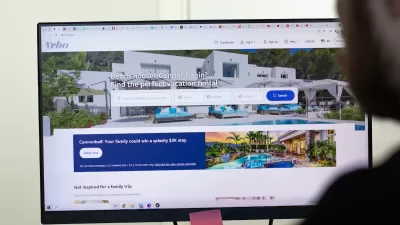This post discusses the argument that even if Airbnb affects an extremely small portion of the rental market, it still matters because of the low vacancy rates of some cities.

A few months ago, I blogged about the impact of Airbnb on rents for traditional month-to-month or year-to-year tenancies. I suggested that this impact was pretty minimal, reasoning as follows: even in a large city such as Los Angeles, Airbnb units are less than 1 percent of all rental units. So even if every single Airbnb unit would (in the absence of Airbnb) otherwise be part of the traditional rental market, Airbnb is unlikely to increase rents in that market.
The comments (and a recent San Francisco Chronicle story) raised an interesting response to my theory: what matters isn't the percentage of all rental units, but the percentage of all rental vacancies or all new housing units. In the words of the Chronicle story: "where a typical year sees just 2,000 new units added, a few hundred units off the market makes a significant dent."
But as I thought about the argument, I was less and less persuaded by it. Here's why: first, the number of vacancies is limited to new housing units. San Francisco has just over 236,000 rental housing units. The units other than the new units are not owned by their current owners or occupants forever: rather, they shift around from occupied to unoccupied as tenants move, and as owner-occupants become landlords or vice versa. So the number of units vacant at any given point in time is a bit higher than the 2000 figure, and the number of units that become vacant at some point over the next year or two will be higher still.
Second, it seems to me that a few hundred units will have little effect upon overall vacancy rates, which in turn means that they will have little effect upon rents. A recent report by the Furman Center [pdf] (affiliated with New York University) lists rental vacancy rates of eleven cities (p.8). San Francisco has the lowest vacancy rate (2.5 percent) and the highest rent ($1491). Boston, New York and Los Angeles are in a virtual three-way tie for second lowest vacancy rate (between 3.4 and 3.5 percent). These three cities are numbers 3-5 in rents (p. 10). (Washington is no. 5 in vacancies but no. 2 in rents, perhaps because Washington is a more affluent city).* At the other end of the spectrum, the two cheapest cities, Houston and Dallas, were no. 10 and no. 9 in rental vacancies. In sum, there seems to be a pretty strong correlation between vacancy rates and rental rates. Since the law of supply and demand suggests that a small supply normally leads to high prices for any commodity, I suspect that this correlation indicates a causal relationship.
The Chronicle story states that "at least 350 entire properties listed on Airbnb ...appear to be full-time vacation rentals, bolstering claims by activists that the services remove scarce housing from the city’s limited inventory." So what would San Francisco's vacancy rate be if these 350 Airbnb units were used for traditional year-to-year rentals instead of shorter tenancies? According to the Furman Center report, there are just over 236,000 rental units in San Francisco (p.40) which means that (assuming the 2.5 percent vacancy rate mentioned above) there are about 5900 rental vacancies. According to the Chronicle story, Airbnb takes 350 rental units off the traditional rental market by turning them into short-term tenancies. So if government compelled those owners to turn their units into year-to-year tenancies, there would perhaps be 6250 rental vacancies. So the rental vacancy rate would be...2.64 percent, still significantly lower than those paragons of affordability New York and Los Angeles. So if the effect of the 350 units upon vacancy rates is that small, it seems to me that their effect upon rents will be that small.
One broader point is what the entire discussion shows about the growth of government regulation of housing. Government uses zoning to artificially constrict the supply of housing (or, in politicianspeak, "protect neighborhoods from overdevelopment"). This in turn causes a housing shortage which leads to higher rents. The higher rents in turn lead to additional government regulation, such as rent control, inclusionary zoning, or (in the case of Airbnb) efforts to prevent property owners from shifting property from the traditional rental market from other markets. In sum, government regulation of housing feeds upon itself.
*The median household income for Washington's renters was just over $46,000, about $5-6,000 higher than the comparable figures for Boston and New York.

Maui's Vacation Rental Debate Turns Ugly
Verbal attacks, misinformation campaigns and fistfights plague a high-stakes debate to convert thousands of vacation rentals into long-term housing.

Planetizen Federal Action Tracker
A weekly monitor of how Trump’s orders and actions are impacting planners and planning in America.

In Urban Planning, AI Prompting Could be the New Design Thinking
Creativity has long been key to great urban design. What if we see AI as our new creative partner?

Pedestrian Deaths Drop, Remain Twice as High as in 2009
Fatalities declined by 4 percent in 2024, but the U.S. is still nowhere close to ‘Vision Zero.’

King County Supportive Housing Program Offers Hope for Unhoused Residents
The county is taking a ‘Housing First’ approach that prioritizes getting people into housing, then offering wraparound supportive services.

Researchers Use AI to Get Clearer Picture of US Housing
Analysts are using artificial intelligence to supercharge their research by allowing them to comb through data faster. Though these AI tools can be error prone, they save time and housing researchers are optimistic about the future.
Urban Design for Planners 1: Software Tools
This six-course series explores essential urban design concepts using open source software and equips planners with the tools they need to participate fully in the urban design process.
Planning for Universal Design
Learn the tools for implementing Universal Design in planning regulations.
planning NEXT
Appalachian Highlands Housing Partners
Mpact (founded as Rail~Volution)
City of Camden Redevelopment Agency
City of Astoria
City of Portland
City of Laramie






























